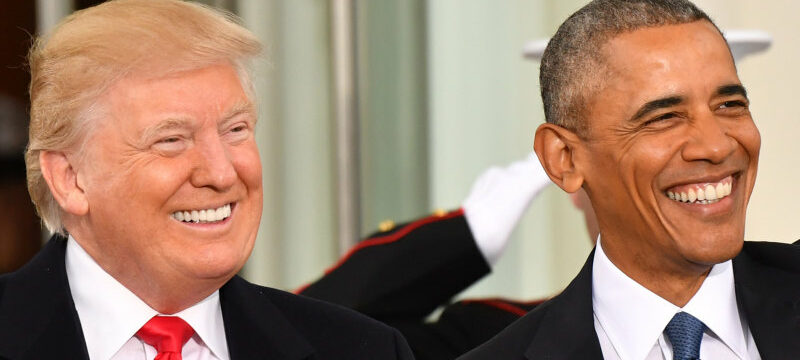To be in America the night Barack Obama won the presidency was to be reminded of why I had fallen in love with the country in the first place. The dynamism. The ambition. The audacity of hope. That restless spirit encapsulated by his electrifying mantra: “Yes we can”.
Here was a once-in-a-generation leader who embodied the ideal of American exceptionalism. Obama knew that himself, as he delivered the opening line of his victory speech at Grant Park in Chicago: “If there is anyone out there who still doubts that America is a place where all things are possible; who still wonders if the dream of our founders is alive in our time; who still questions the power of our democracy, tonight is your answer.”
Barack Obama at his inaugural address in Washington, January 20, 2009.Credit:Reuters
Though it was heady to report on the country’s first black president, I was not completely intoxicated. Given how polarised Washington had become since the end of the Cold War, I did not think he could bring about a post-partisan country, still less a post-racial society. The breach between black and white America was already too wide and deep for that. But even if he might struggle to become truly transformational, I still thought he would be a transitional figure: someone who could smooth the path as the country moved by mid-century towards becoming a majority-minority nation in which non-whites outnumbered whites.
For a superpower in decline after the attacks of September 11 and its needless war in Iraq, Obama was the rejoinder. Not since John F. Kennedy had a US leader so captivated the world.
America’s 44th president is in Australia this week, and will doubtless exhibit the attributes that made him such a political superstar. His lyricism. His grace. His cool. All the character traits that differentiate him from the grotesqueries of his successor, the anti-Obama and anti-president Donald Trump, who warned over the weekend of “potential death and destruction” if he is indicted. After four years of Trumpism, countries now try to inoculate themselves from the American strain of democracy, with its polarisation, dysfunction and violent extremism. The sight of a Trump flag being brandished is often the first sign of contamination.
Yet the sad truth is that American exceptionalism was flat-lining long before the New York tycoon descended his golden escalator in 2015 to announce his bid for the White House. The dissolution of the United States accelerated under Obama.
Barack Obama’s successor, Donald Trump.Credit:AP
Even though his economic stimulus package helped save American capitalism after the Great Recession of 2008, it became hard to find parents who thought their children would lead more prosperous lives, the essence of the American dream.
Even though he withdrew US forces from Iraq and did much to restore America’s international standing, his failure to enforce a red line over the use of chemical weapons by the Assad regime undercut US global leadership. Vladimir Putin was given a green light to escalate Russia’s involvement in Syria, which emboldened him first in Crimea and then the rest of Ukraine.
The massacre at Sandy Hook in 2012 showed that even the murder of 26 people, including 20 children aged between six and seven, could not persuade a Republican-dominated Congress to enact gun controls, Obama’s biggest regret as president. Nothing better illustrates the country’s chronic dysfunction than the failure to ameliorate its mass shootings epidemic; or how American exceptionalism has come to be associated with violence rather than virtue.
From the outset, Obama faced a wall of Republican opposition. On the night of his inauguration in 2009, a cabal of hardline conservatives, including the present House Speaker Kevin McCarthy, gathered at a restaurant in Washington and vowed to destroy his presidency. The Tea Party, which began as a reaction to the Bush administration’s bank bailout, soon became virulently anti-Obama and all too often viciously racist. Then came the nativist “birther movement”, under its untitled leader Donald Trump. From Newt Gingrich’s “Republican Revolution” in the early 1990s onwards, the evidence had been mounting, but it was during the Obama years that we realised how unhinged the American conservative movement had become.
What his presidency showed, above all, was that not even the election of the country’s first black president could solve the American dilemma of race. Throughout US history, black advance has routinely been met with a white backlash. After the rise of Barack Obama, it manifested in the rise of Donald Trump.
Illustration: Jim PavlidisCredit:
Thus, the Obama presidency was anti-climactic. Rather than moving the country towards being “a more perfect union” – words he borrowed from the preamble to the US Constitution which became his stock phrase, disunion became America’s defining characteristic. Unable to make good his promise of a “United States of America”, he became the leader of one nation divisible, a deeply fractured land. Not even a leader as gifted, moderate, pragmatic and non-threatening could repair the breach, which is why his presidency was ultimately so disheartening.
Maybe we should put it down to the allurement of false hope. But rather than being a unifying president, his presence in the White House merely brought centuries-old divisions to the fore. A president who embodied the best of America also brought out the worst.
The Opinion newsletter is a weekly wrap of views that will challenge, champion and inform your own. Sign up here.
Most Viewed in World
From our partners
Source: Read Full Article



